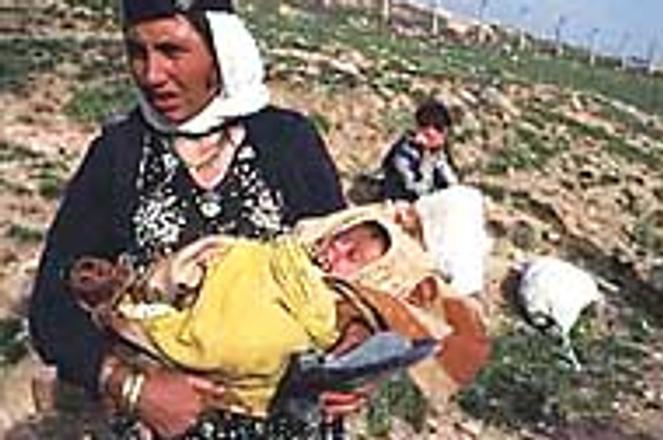WAR in Iraq has brought tighter security and an influx of Iraqis seeking refuge.photo: UNHCR and TASR
AS THE military conflict in the Persian Gulf continued, Iraqi refugees began to trickle through Slovakia's eastern border with Ukraine, causing officials to brace for an influx of asylum seekers.
By March 27, dozens of Iraqi refugees fleeing the war had illegally crossed the border from Ukraine, according to media reports, with 24 ending up in Slovak asylum facilities.
"As of March 25 there were 343 asylum seekers in total in our asylum facilities. These facilities can take in as many as 800 or 900 people. At this point 24 out of the 343 people are from Iraq," said Anna Šidová, head of the state migration office's legal department, adding that her office is taking steps to prepare for the arrival of more refugees.
"We have taken measures assigned by the interior minister's crisis headquarters, which are determined by the current state of international affairs," she said. "You don't have to be a prophet to see that more refugees will come. I doubt it will be thousands, but perhaps a couple of hundred refugees in all."
Aid organisations agreed that Slovakia should be prepared to receive more refugees from the region in the near future.
"Although we are not seeing it yet, we cannot rule out an increase of asylum seekers in the weeks to come. We could see a repeat of the situation that arose following the attacks on Afghanistan [at the end of 2001], when a large wave of refugees flooded the neighbouring countries and subsequently Europe," said Mária Čierna, spokeswoman for the United Nations High Commissioner for Refugees (UNHCR) office in Bratislava.
BORDER police are stepping up surveillance.photo: TASR
Officials said the Iraqis in Slovakia would not be subject to extra security checks, and would be treated like refugees from any other country.
"These people are protected by both our asylum law and the Geneva convention on the status of refugees. We have to take care of these people in accordance with this legislation," said Šidová.
"The police have to take fingerprints, photographs, and make checks in certain registers. These people do not usually have passports or ID cards. Most of them cross the border illegally and it takes a certain time before they can be identified. Their identity has to be compared with data in the register of international suspects," she added.
According to information from the migration office, most Iraqi refugees start their journey in the Middle East and get to Ukraine through Russia. In Ukraine there are Slovak traffickers, who help people get across the border.
"In our camps we have both individuals and families. Everyone is worried about their loved ones and are grateful for the feeling of safety and hospitality," said Čierna.
One woman from Baghdad told daily SME reporters that she had paid $15,000 to be smuggled out of the country with her three children. Other Iraqi asylum seekers in Slovakia say they are pleased to be safe, but still live in fear of the Baghdad regime.
"They say they are afraid that Slovak informers will tell the Iraqi government if they criticise Saddam Hussein," said Čierna.
Despite the advantages Slovakia offers, it still remains largely a country of transit.
"The fact is, Slovakia will only be a final destination once we are in the EU and the economy is at a level that will be attractive to refugees," said Šidová.
But even if the Iraqi refugees wanted to stay in the country, they would be denied asylum, officials said.
"The country signed an agreement that stipulates that applicants from Iraq will not be granted asylum before the conflict in Iraq is over. Naturally, no one will be expelled to Iraq, because while the conflict lasts these people will be here on a so-called 'tolerated stay', but no EU country is granting asylum before the conflict is over and nor are we," said Šidová.
She did not say why, stating: "I don't want to speculate. It's just a fact."
Experts, including the UNHCR, were surprised by the relatively small number of refugees fleeing Iraq after the crisis erupted.
"The UNHCR had been getting ready for an influx of refugees from Iraq to neighbouring countries from the beginning of February. We expected a humanitarian crisis involving around 2 million Iraqis becoming refugees within their own country and further 600,000 to 2 million Iraqis fleeing to neighbouring countries - Iran, Jordan, Syria, Turkey, and Kuwait," said Čierna.
"However, the first week of the crisis was very different from this scenario. The UNHCR has so far not registered a significant number crossing the border. Up to March 25, the UNHCR has registered a total of 22,000 Iraqis who left their homes and headed [north]," she added.
UNHCR statistics show that there were already around 200,000 Iraqi refugees in Iran before the start of the latest conflict.
"Iraqi refugees became the largest group of refugees in the world in 2002, with almost 52,000 filing asylum requests, overtaking the Afghan community, which had been the largest in history before that," said Čierna.
The UNHCR has 15 offices and more than 200 humanitarian aid workers in the countries surrounding Iraq, and has prepared humanitarian aid packages - consisting of tents, blankets, water canisters, and food - for 300,000 people.


